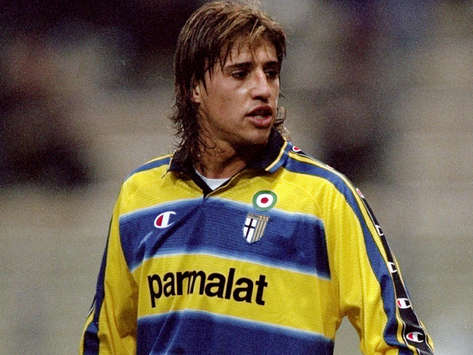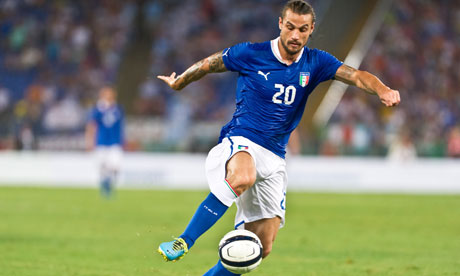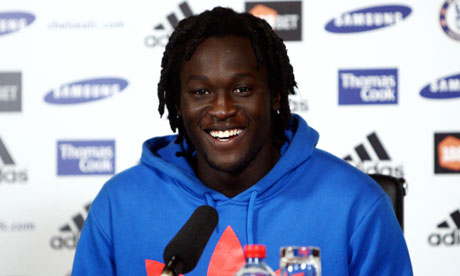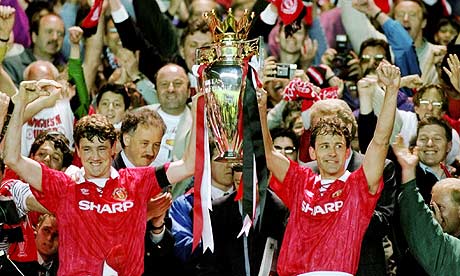It's May 1997 - Carlo Ancelotti, in his first managerial season at the club where his playing career first begun, has fallen three points short of delivering Parma their first Scudetto.
Taking on a talented Juventus outfit at the top of Serie A, Parma's nearly moment had all the right ingredients. Bankrolled by Parmalat, the ambitious though ultimately fraudulent company owned by Calisto Tanzi, Ancelotti rebuilt an already successful Parma squad to suit his vision.
High profile names such as Fernando Couto and Hristo Stoichkov were sold to Barcelona to make way for new recruits - most notably the signing of a young Hernan Crespo from River Plate. Crespo would waste no time in showcasing his ability, chiming up a strong relationship with Enrico Chiesa in the absence of Gianfranco Zola, sold to Chelsea midway through the season. At the back Fabio Cannavaro and Lilian Thuram were showing signs that they would become two of the best central defenders in the world whilst in goal Gianluigi Buffon emerged as the latest in a string of fine Italian goalkeepers.
 |
| Hernan Crespo - Parma's skillful Argentine. |
What followed was a run of patchy results. Wins against the likes of Cagliari and Reggina were overshadowed by an inability to beat stronger opposition and defeats to Lazio and Inter Milan took the wind out of Parma's early season sails. But with the new signings starting to gel Parma secured back to back 1-0 wins against AC Milan and Juventus, highlighting their credentials as serious title contenders.
Chiesa would eventually finish up with 14 goals for the season, Crespo 12, but the rest of the side struggled to contribute goals; Mario Stanic was the next highest scorer on three. Juventus were hardly prolific themselves though they had a number of players spreading the goals around - Alessandro Del Piero, Michele Padavano and Christian Vieri all chipped in throughout the season with eight a piece. Juventus's strength in depth would prove to be the key factor over the course of the season.
 |
| Lilian Thuram and a fresh faced Gigi Buffon. |
The sale of Zola in November hurt Parma in terms of attacking options at Ancelotti's disposal and the decision to sell Filippo Inzaghi the previous summer was a bad error of judgement. Sold to Atlanta he finished top scorer in Serie A that very season with 24 goals - goals that would have won Parma the title. Ancelotti would later come to value Inzaghi highly during his spells at Juventus and AC Milan.
But even the loan signing of Leeds flop Thomas Brolin in January could not derail Parma's surge towards the title. I Crociati overturned their early season defeats to Lazio and Inter Milan, 2-0 and 1-0 respectively, as their performances reached a peak. But a home loss to Udinese and failure to beat AC Milan meant Parma's end of season showdown with Juventus would be crucial in deciding where the title would end up.
 |
| Winning the UEFA CUP. |
Parma welcomed Juventus to Il Tardini on the 18th of May 1997. Zinedine Zidane, a revelation since his move from Bordeaux, scored on own goal on 29 minutes and Parma dared to dream. But Juventus responded before half-time, Nicola Amoruso scoring a particularly dubious penalty, as he would five years later against Celtic in the Champions League. Parma needed the win whilst Juventus could afford to draw in the knowledge that anything but a loss against Atlanta the following week would be enough to win them the title. Parma won their following game 1-0 at home to Bologna but Juventus kept their side of the deal as the Old Lady secured title number 24.
Though the Scudetto alluded Parma, the 90s would be their most successful spell to date with the side going on to win the UEFA Cup and Coppa Italia in 1998. After which the Italian superpowers came calling and Parma's exciting young squad was disbanded in a short space of time; Juventus signed Buffon and Thuram, Inter Cannavaro whilst Lazio spend big on Crespo and Juan Sebastian Veron. Unable to bring Parma any closer to a Scudetto and anticipating the sale of key players Ancelotti moved on to Juventus in 1999.

















